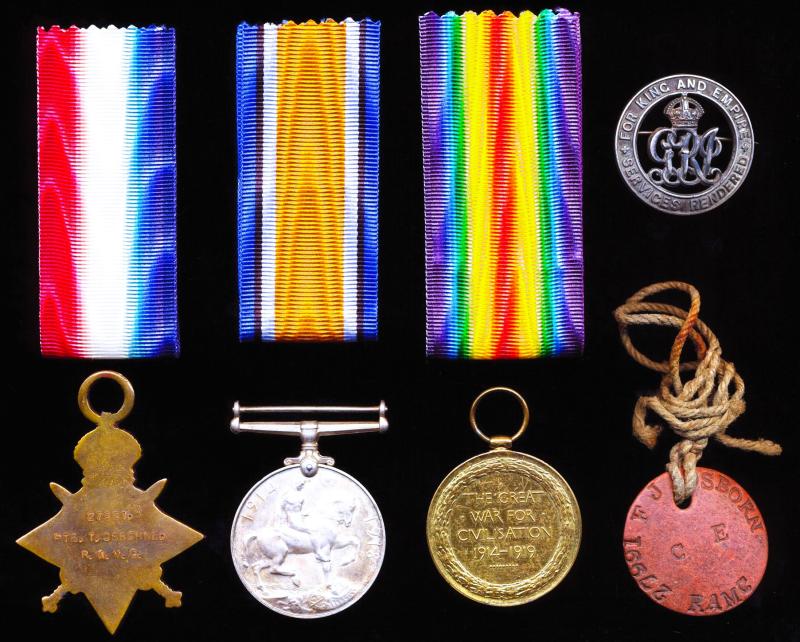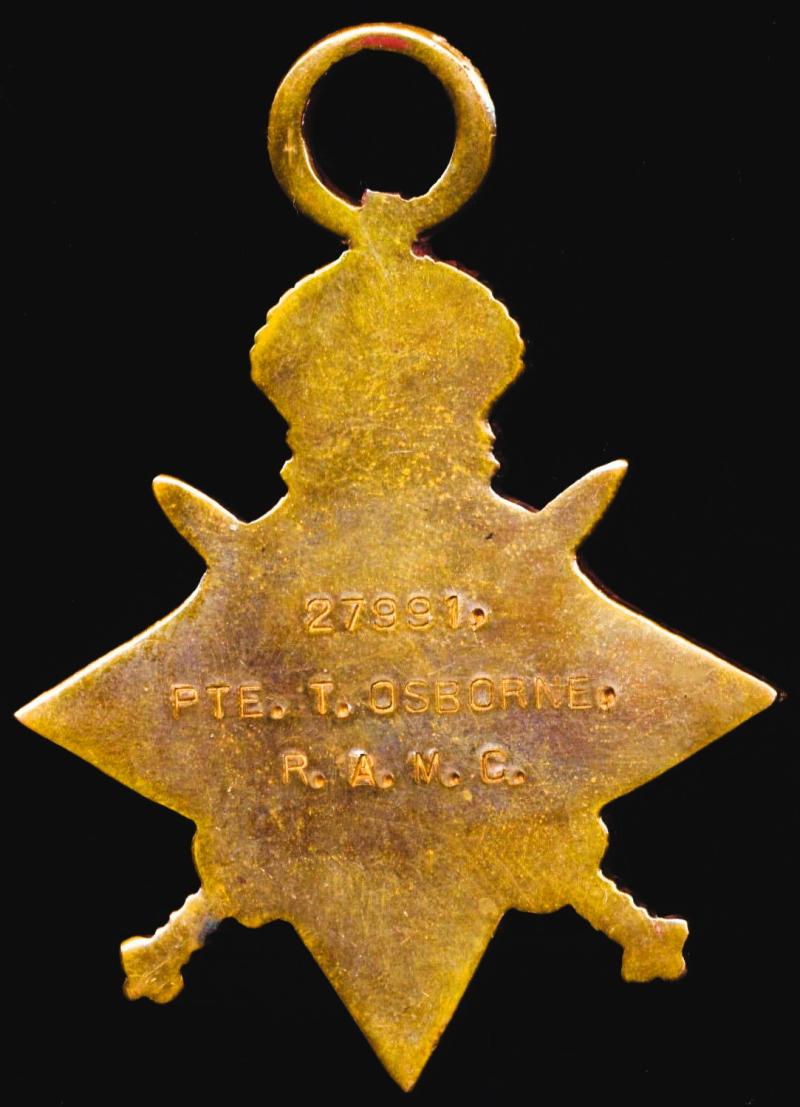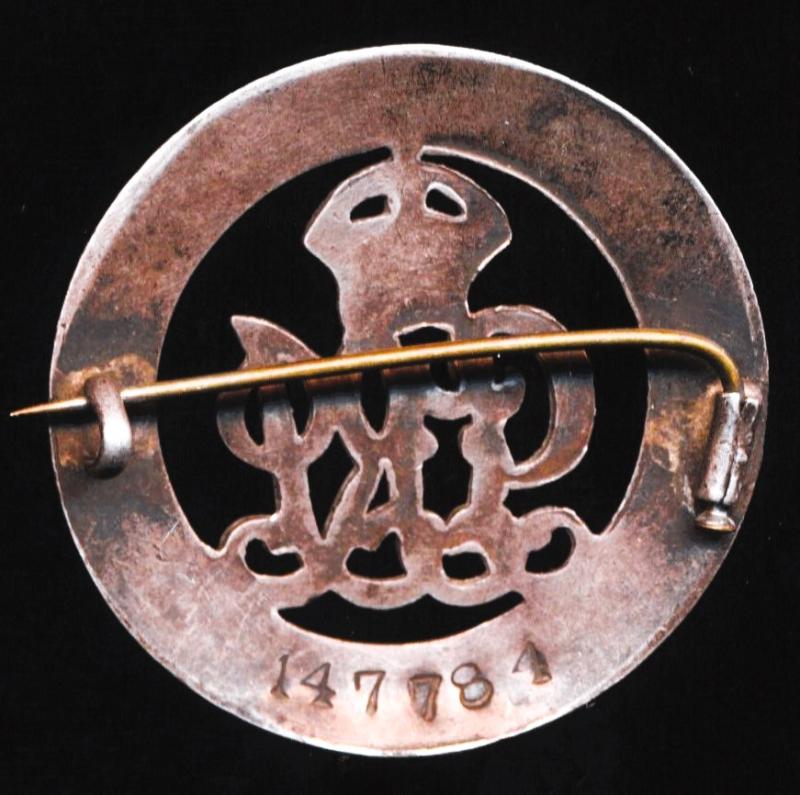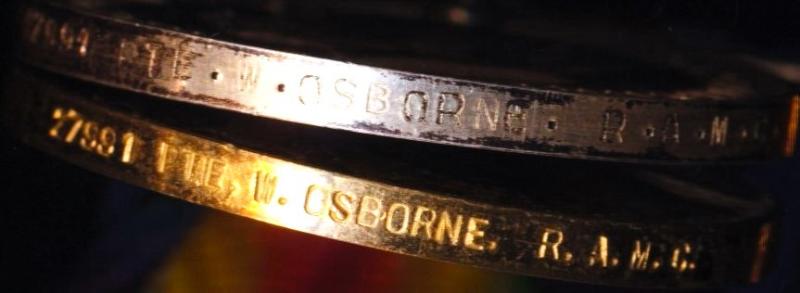A 'Farthingstone' Shepherd's Great War 'Salonika' campaign & companion Silver War Badge group of 4: Private Foster Jones Osborn, Royal Army Medical Corps
- 1914-15 Star (27991, Pte. T. Osborne, R.A.M.C.)
- British War Medal. Silver issue (27991 Pte. W. Osborne, R.A.M.C.)
- Interallied Victory Medal (27991 Pte. W. Osborne, R.A.M.C.)
- Silver War Badge (147784)
The SWB with replacement hinged pin
Sold together with:
- Recipients British Army Identity Disc. Fibre (27991 F J Osborn RAMC, C E)
Medals and Silver War Badge verification: All medals and Silver War Badge confirmed as entitled per the respective campaign medal rolls of the Royal Army Medical Corps cited below:
- 1914-15 Star: WO 329/2908 (shown on roll with forename initial 'T' - the roll never corrected and the medal 'as issued' with the typo!)
- British War Medal WO 329/2093 (the medal roll showing surname erroneously as Osborne, & forename typo W - the roll never corrected & medal as issued)
- Interallied Victory Medal: WO 329/2093 (the medal roll showing surname erroneously as Osborne, forename typo W - the roll never corrected & medal as issued)
- Silver War Badge (147784): WO 329/3230 (shows enlisted 3 November 1914 discharged 17 October 1916 / Sickness)
The recipients 2 x Medal Index Cards (one for the star, the other for the pair), also perpetuate the careless clerical errors, referred above. Evidently, the hapless recipient never bothered to return his medals for official correction.
Foster Jones Osborn son of George Osborn (an Agricultural Labourer) and Annie Jane Osborn (nee Jones) was a native of Farthingstone, Northamptonshire, where he was born, on 9 August 1883. Prior to the Great Warm Foster was employed as a 'Shepherd' (the 1911 National Census for England & Wales refers). On, 3 November 1914, at which time he described himself as a 'Gardener' he volunteered for service in the British Army, when he enlisted at, Tring. Hampshire, at which time he was posted to the Royal Army Medical Corps. After completion of his basic training, Foster was subsequently posted overseas on active service with the Mediterranean Expeditionary Force where he served at Salonika - a theatre of war notorious for unusually high rates of sickness - between, 6 October 1915 to 25 February 1916. Foster's service papers show that he was posted to 10th Infantry Division in Salonika, where he joined the 31st Field Ambulance unit, at 'Dedeli Pass' locality. Foster was invalided to England on, 26 February 1916, and subsequently took his final discharge form the British Army on, 17 October 1916, 'No longer being physically fit for War Service'. By the time he took his final discharge from the British Army, Foster had served, 1 year 350 days 'With The Colours'. After taking his discharge, Foster returned to his native roots in Farthingstone, Northamptonshire, England. At the time of the compilation of the 1939 National Register for England, Foster is recorded working as a 'Labourer Army Ordnance Depot', and residing at 'Woodbine Cottage' Daventry, Farthingstone. Post 1945, Foster latterly resided at 'Willow Cottage' Everdon Road, Farthingstone, where he died on, 19 April 1976
The recipients service papers are extant & accessible at The National Archives
The Great War medals near pristine. Choice condition
Condition: EF
Code: 23629
140.00 GBP







